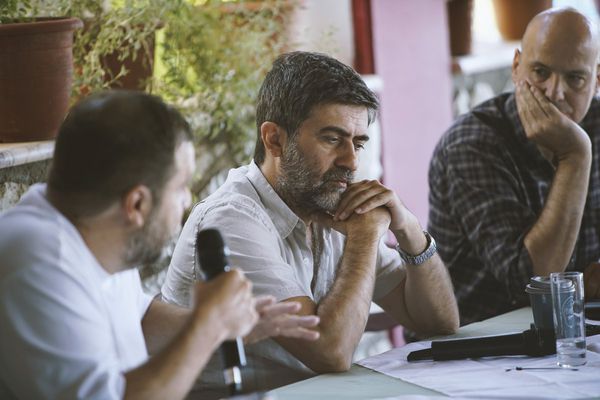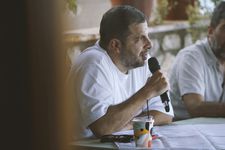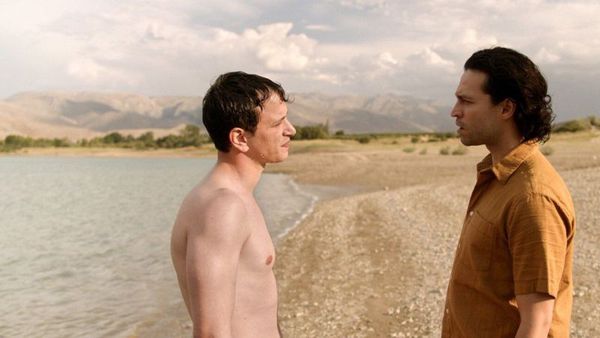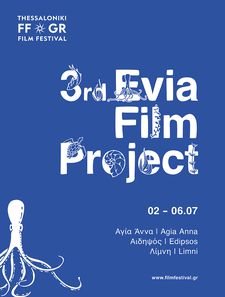 |
| Yorgos Tsourgiannis, left, and Emin Alper, centre, during the masterclass Photo: Courtesy of Thessaloniki International Film Festival |
Speaking about how they met, at a pitching forum, Tsourgiannis said they “connected immediately”.
Alper added: “You meet many producers at festivals but there's only chemistry with a small group of them, and we have this kind of chemistry.”
While Tsourgiannis noted the nuts and bolts element of being a producer, in terms of helping the shoot to go ahead, he also pointed out that it is also concerned with the development of the film’s ideas and is a “deeply creative process”.
 |
| Yorgos Tsourgiannis at the masterclass Photo: Courtesy of Thessaloniki International Film Festival |
Alper said that the collaboration between himself and his producers can be invaluable, as they offer important feedback on his scripts.
“When you are writing, you indulge yourself in your work so you lose your perspective. You cannot understand if it is good or not. So the only moment that you get a little distance from your script, is when you get feedback and, of course, you should get feedback from the ones you trust.”
Striking a cautionary note, he added: “As scriptwriters, you will get a lot of feedback when you write some scripts, and some of it will be really bullshit, it can confuse you. But if you get feedback from the ones you trust, it’s really valuable.”
The filmmaker also revealed that he once asked an AI bot to write a script like Emin Alper.
“I really did,” he said. “Despite all my input, the AI wrote a happy ending so it was very disappointing.”
He added: “Then, I decided to write another script with AI.It was a love story between a Greek woman and Turkish man. It wrote a love story between Jamal and Eleni and there was a bad guy called Nikos, the ex-lover of Eleni. He did everything to destroy the relationship, but in the end he failed.”
Alper says that he writes his first draft of a script very quickly but that the rewriting is where the “real writing” lies. For Burning Days he said he went through 17 drafts of script. He added: “You never stop because script writing continues in the editing as well. Many things can change in the editing. I don’t want to exaggerate because you cannot change the structure, of course, but many small things can be changed, nearly everything. So the writing process continues in the editing and you can never be sure it’s done. An invitation from a festival usually stops this process!”
Asked if he is ever tempted to move to a different region of Europe, such as Scandinavia, where he might have easier access to funds, Tsourgiannis said at the start of his career he did have some opportunities to do that but that it became more of an “indulgent fantasy” after a while.
 |
| Emin Alper on Burning Days: 'The writing process continues in the editing and you can never be sure it’s done' |
Alper agreed, and added: “Every country has some difficulties. I have German friends and I also hear thousands of complaints from them. They have to wait for many years, for example ZDF is always full. In Sweden, they work eight hours a day… it’s impossible to shoot a film by working eight hours a day.”
He noted that the streaming series The Offer highlights all the problems producer Albert S Ruddy encountered when trying to make The Godfather. He said: “So, even in the United States, it can be very difficult because you need so much money and it's always difficult to find money and whatever the amount you get, it's always not enough.”
He said he has thought about leaving Turkey but added: “I believe there are two kinds of people. One, who can live abroad. The other, who cannot live abroad? I think I'm in the second category. So, I resisted.”
Turning to the political, he noted that “some people say populists, some people say neo-fascist or post-fascist. All these guys are popular around the world.
 |
| Evia Film Project poster |
“So the first thing that we try to save is law and justice. In France, there were elections, they have the same danger in Germany, these ultra-right government possibilities. They all do the same thing because they imitate each other. They immediately attack the system of justice.”
Alper said he likes to tackle the notion of innocence within his films but added that: “As a citizen this is a problem for me because we are victims of this system. I have friends in prison. We have to witness unbearable injustices. In the country. On the one hand, of course, we are making art, but on the other hand, I like to be part of this modest struggle against dictators.”





















